|
|
|
Sort Order |
|
|
|
Items / Page
|
|
|
|
|
|
|
| Srl | Item |
| 1 |
ID:
107895
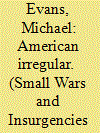

|
|
|
|
|
| Publication |
2011.
|
| Summary/Abstract |
This article examines the portrayal of frontier conflict in American writer, Cormac McCarthy's 1985 novel, Blood Meridian, or the Evening Redness in the West. It argues that McCarthy's work is one of the most profound American literary meditations ever composed on the subject of irregular conflict. The article traces the novel's literary antecedents and historical background and analyses its use of language, its structural narrative, and its lyrical descriptions of bloodshed and extreme guerrilla violence on the Texas-Mexican frontier in the mid nineteenth century. Particular attention is paid to McCarthy's development of a philosophy of war, which is related to the Counter-Enlightenment ideas of Joseph de Maistre and Friedrich Nietzsche. It is suggested that McCarthy employs the experience of irregular conflict on the American frontier as a philosophical lens to articulate the idea of war as a form of divination - an approach that is based on a mixture of Maistre's theory of redemptive violence and Nietzsche's cult of the existential warrior. The article concludes that McCarthy's blending of irregular conflict with a philosophy of war - empowered as it is by some of the most sumptuous of all twentieth-century American literary prose - endow this classic novel with a timeless and transcendental quality. McCarthy's unflinching representation of the anatomy of irregular conflict thus emerges not only as a searing portrayal of America's past frontier experience, but also as a powerful metaphor for understanding the endemic violence of twenty-first century insurgency in such countries as Iraq and Afghanistan.
|
|
|
|
|
|
|
|
|
|
|
|
|
|
|
|
| 2 |
ID:
107903
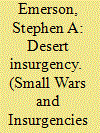

|
|
|
|
|
| Publication |
2011.
|
| Summary/Abstract |
This article provides an in-depth examination and analysis of the 2006-2009 Tuareg rebellion in Mali and Niger. It identifies the underlying reasons behind the rebellion, explores contrasting counter-insurgency (COIN) strategies employed by the two governments, and presents some lessons learned. While both COIN approaches ultimately produced similar peace settlements, the article argues that the Malian strategy of reconciliation combined with the selective use of force was far more effective than the Nigerien iron fist approach at limiting the size and scope of the insurgency and producing a more sustainable peace. It concludes by looking at the role of external actors, particularly the United States, and how the failure to internationalize the conflict was actually more beneficial to the local COIN effort, as well as to the longer strategic interests of the United States in the region.
|
|
|
|
|
|
|
|
|
|
|
|
|
|
|
|
| 3 |
ID:
107904


|
|
|
|
|
| Publication |
2011.
|
| Summary/Abstract |
Under what conditions can leaders achieve wartime political-military integration? In the Vietnam War, political-military integration exhibited dramatic variation: in the air war, the US was able to tightly integrate its political objectives and military conduct, but in the ground war, the American military prosecuted a strategy that was both divorced from broader political objectives and was immune from Washington's influence. I argue that the nature of information management between the military and civilian leadership explains the pattern of political-military integration in the Vietnam War more completely than do explanations that focus on the organizational cultures of professional militaries.
|
|
|
|
|
|
|
|
|
|
|
|
|
|
|
|
| 4 |
ID:
107897
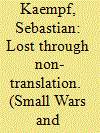

|
|
|
|
|
| Publication |
2011.
|
| Summary/Abstract |
While Carl von Clausewitz has generally been respected as one of the most profound philosophers of war, his expertise has been regarded as somewhat limited if not even irrelevant to the so-called 'new wars' of the post-Cold War world. Many scholars in international relations have claimed that 'new wars' are essentially 'post-Clausewitzian' and 'post-trinitarian' in nature, meaning that they are no longer fathomable through a Clausewitzian framework. However Clausewitz's earlier writings were nearly exclusively dedicated to guerrilla warfare, or what he called 'small wars'. These writings have been largely overlooked by many analysts of contemporary conflicts. By drawing on his rare and untranslated writings, the article uncovers a critical part of Clausewitz's expertise in asymmetric warfare and shows that, far from being irrelevant in an age where interstate warfare is increasingly being replaced by conflicts between states and semi-/non-state actors, Clausewitz's philosophical writings actually shed new light into the particular interactive dynamics generated during wars waged under conditions of asymmetry.
|
|
|
|
|
|
|
|
|
|
|
|
|
|
|
|
| 5 |
ID:
107898
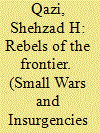

|
|
|
|
|
| Publication |
2011.
|
| Summary/Abstract |
The Pakistani Taliban, factionalized into some 40 groups, form a decentralized insurgent movement, often characterized by infighting, divergent motivations, and a shifting web of alliances. The Pakistani Taliban remain little understood because most scholars have avoided a serious treatment of the insurgent movement and instead focused on analyzing the geopolitics of the region and Pakistan's 'double game'. This article seeks to fill this gap by dissecting the movement through selected theories of organization and mobilization. First, I explain the various dimensions of the conflict and the origins of the insurgency. Next, I discuss the Pakistani Taliban's political organization, categorizing it as composed of various warlord regimes. I further list the Taliban's component groups and numerical strength and chart the leadership structure. Lastly, I analyze insurgent recruitment strategies, accounting for the role of selective incentives, coercion, and genuine grievances.
|
|
|
|
|
|
|
|
|
|
|
|
|
|
|
|
| 6 |
ID:
107900
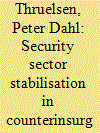

|
|
|
|
|
| Publication |
2011.
|
| Summary/Abstract |
This article argues that the debate on security sector reform (SSR) needs to be taken further by taking into consideration the fact that, even though the SSR concept was not originally developed as an element in stabilising states undergoing an insurgency, it is very much being used for exactly that. When conducting counterinsurgency with a focus on the creation of stability, the baseline will ultimately have to be security sector stabilisation (SSS) as a precondition for complete SSR implementation. However, the two must be connected to avoid them undermining each other. This is important if a comprehensive approach to programme implementation and especially sustainability is to guide the programme, and not just isolated 'train and equip' stand-alone projects that do not solve either the initial need for stabilisation or the long-term need for accountable security forces. Currently, in Afghanistan the surge for security by the international military is in danger of overtaking the other elements of the SSR, thereby undermining the primary end state and thus risking laying the wrong foundation for the long-term process of SSR.
|
|
|
|
|
|
|
|
|
|
|
|
|
|
|
|
| 7 |
ID:
107901
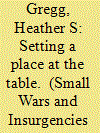

|
|
|
|
|
| Publication |
2011.
|
| Summary/Abstract |
This article argues that, under certain conditions, allowing insurgents into the political process - through elections or government posts - can be a useful tool in the peace process and can help end insurgencies. However, bringing insurgents into the political process is unlikely to end insurgencies on its own, particularly if insurgents, the government, or the population believes that force is still a viable means of defeating the opponent and changing the status quo. The article begins with a brief overview of the causes of insurgency and on conflict resolution for internal wars. The article then considers two examples of insurgents that have entered the political process - the Irish Republican Army (IRA) in Northern Ireland and Hezbollah in Lebanon - and the differing degrees of success in transforming these insurgents to non-violent participants in the political process. It concludes by suggesting how insurgents can be brought into the political process as part of conflict resolution and the implications for Afghanistan.
|
|
|
|
|
|
|
|
|
|
|
|
|
|
|
|
| 8 |
ID:
107899
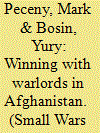

|
|
|
|
|
| Publication |
2011.
|
| Summary/Abstract |
A fundamental contradiction has been built into America's intervention in Afghanistan since the first days of the war in 2001. On the one hand, US policymakers have viewed the promotion of liberal democracy, economic development, and strong centralized state institutions as essential to achieve victory over the long term. On the other hand, however, the US has relied on local warlords to win its battles against the Taliban from the first days of the intervention. The Obama administration's tortured policy review reflects the intractable dilemmas involved in trying to build a modern democratic state while relying on local warlords as crucial allies in the war against the Taliban.
|
|
|
|
|
|
|
|
|
|
|
|
|
|
|
|
|
|
|
|
|